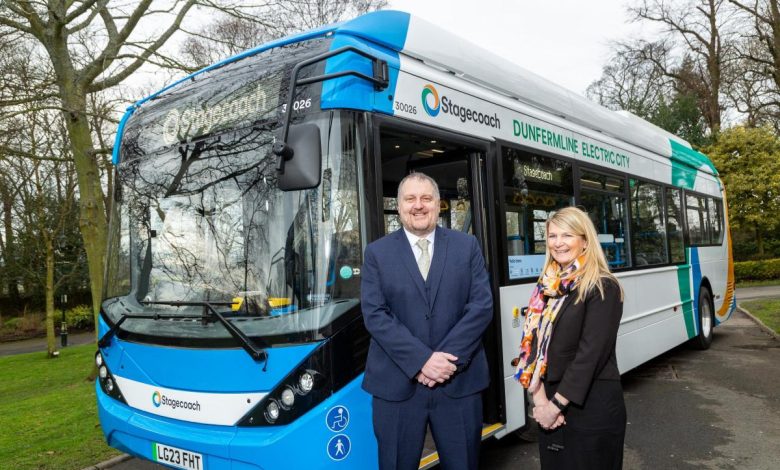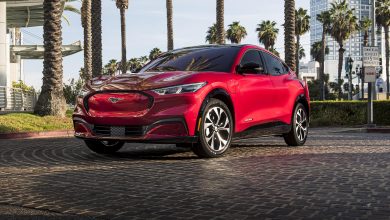Self-Driving Buses Fleet Invades Major Cities
Autonomous Driving/AIEV NewsMore states in the U.S. ready to welcome autonomous vehicles

Self-driving cars are regular sights but that trend is moving to commercial bus fleets. The Scottish government has concluded plans to bring self-driving tech into the mainstream. From May 2023, five fully autonomous buses will ply the streets close to Edinburgh according to Stagecoach, the largest bus and coach operator in the United Kingdom. The company will manage the autonomous-driving bus fleet.
Codenamed CAVForth, the project will be the world’s first full-size, autonomous-driving public bus service according to the UK government. “CAV” is an acronym for Connected and Autonomous Vehicles”.
The goal of the service, when it becomes operational, is to transport 10,000 passengers per week. In the first phase, the autonomous driving buses will run a 14 miles circuit route that navigates through the iconic Forth Road Bridge—a major landmark in Scotland.
The buses are equipped with sensors that allow them to travel on pre-mapped roads at up to 50 mph. The buses have Level 4 autonomous driving capability which means a driver is not expected to control the vehicle when in autonomous mode. However, a trained safety driver will be onboard.
The UK still doesn’t legally permit driverless vehicles. A safety driver is required to be on board an autonomous vehicle at all times. Nevertheless, the government is working on regulatory reforms and an assurance framework that may scrap that requirement.
The project is the culmination of four years of planning
The rollout of the CAVForth autonomous bus fleet in May will mark the culmination of more than four years of planning, research, and development. There is a similar project planned for Belfast and Sunderland. According to the Scottish Minister for Transport, Kevin Stewart, the ambitious project is an interesting milestone that will “establish [Scotland’s] credentials on the world stage”.
The estimated cost of the project is around $7.5 million dollars. It was partly funded by the Center for Connected and Autonomous Vehicles (CCAV) in partnership with Innovate UK. The UK government’s Intelligent Mobility Fund has earmarked about $124 million to fast-track the commercialization of autonomous driving transport technology.
It is important to mention that autonomous driving buses are not a new concept. In 2021, Malaga, Spain welcomed their first electric autonomous driving bus. The project is regarded as the first of its kind in Europe. The Cambridge Connector project in the UK which plans to deploy 13 self-driving vehicles across the city will launch in 2024.
Arguably the largest autonomous driving vehicle project in Europe is ULTIMO which is backed by a budget of over €55 million. The project will test self-driving public transport services in three key European cities namely Oslo in Norway, Kronach in Germany, and Geneva in Switzerland.
Achieving fully autonomous vehicle capability has been one of the long-term goals of major automakers around the globe. A large number of startups are also vying for a market share in the industry. However, multiple setbacks have held back those vehicles from taking the center stage on public roads
More states in the U.S. ready to welcome autonomous vehicles

Regardless of the glitches that have been experienced with autonomous driving vehicles, more states are ready to allow AVs to run on public roads. Mississippi and Kentucky recently passed legislation to mandate AVs. Late March 2023, Mississippi approved House Bill 1003 which allows AVs on public roads. The move was hailed by the Autonomous Vehicle Industry Association.
“[We applaud] Governor Tate Reeves for signing HB 1003 and officially opening Mississippi to the safety, mobility, and economic benefits of AVs,” said Jeff Farrah, the association’s executive director. “Mississippi now joins 22 other states that have unlocked the technology, safety, and supply chain benefits of autonomous vehicles.”
Kentucky has declared interest to become the 23rd state to pass legislation on AVs. In the first week of April 2023, Kentucky’s general assembly passed a bill that lays the foundation for AV mandate. According to the legislation’s framework, AVs can operate in the state with a human driver on board. Also, it has to meet certain conditions including;
- Operate in compliance with the applicable traffic and motor vehicle safety rules and regulations of the state, unless granted an exception by the Transportation Cabinet
- In the event of autonomous driving system failure, “the fully autonomous vehicle will achieve a 4 minimal risk condition”
- The vehicle may be required by federal law to bear the manufacturer’s certification label to show it has been certified to be in compliance with relevant federal vehicle safety standards at the time of production
If the AV meets the series of separate qualifications, then it can cruise through the streets of Kentucky without a driver in the cabin. Before these vehicles are permitted, a human must submit a law enforcement interaction plan to the Kentucky State Police and the state’s Department of Transportation.
The application must contain details of how to communicate with a “fleet support specialist who is available during the times the vehicle is in operation,” how to safely remove the vehicle from the roadway when necessary as well as other necessary information.
The operators of fully autonomous vehicles must show proof that the vehicle has single-limit liability coverage of at least $5 million before they can be allowed on the road. Governor Andy Beshear of Kentucky is yet to sign the legislation.
There are oppositions to the rollout of AVs in Kentucky
While Rep. Josh Bray, the sponsor of the bill, has stressed that Kentucky was the right place for AV rollout, others like the Insurance Institute for Highway Safety (IIHS) have voiced their reservations. According to IIHS, AVs can make roads more dangerous.
The president of the agency, David Harkey, spoke during a virtual Capitol Hill briefing on March 7. Harkey said that he was in support of modern technologies including driver assistance tools but will not throw his weight behind autonomous driving vehicles.
“We firmly believe it is critical for the driver to remain engaged in the driving task at all times and always be responsible for all actions of the vehicle,” Harkey told legislators. “We do not believe in the promise of technology to completely replace drivers and for the vehicle to assume all responsibility for vehicle operations.”
Related
GreenPower EVs Qualify For Up To $40,000 Commercial Clean Vehicle Credit




